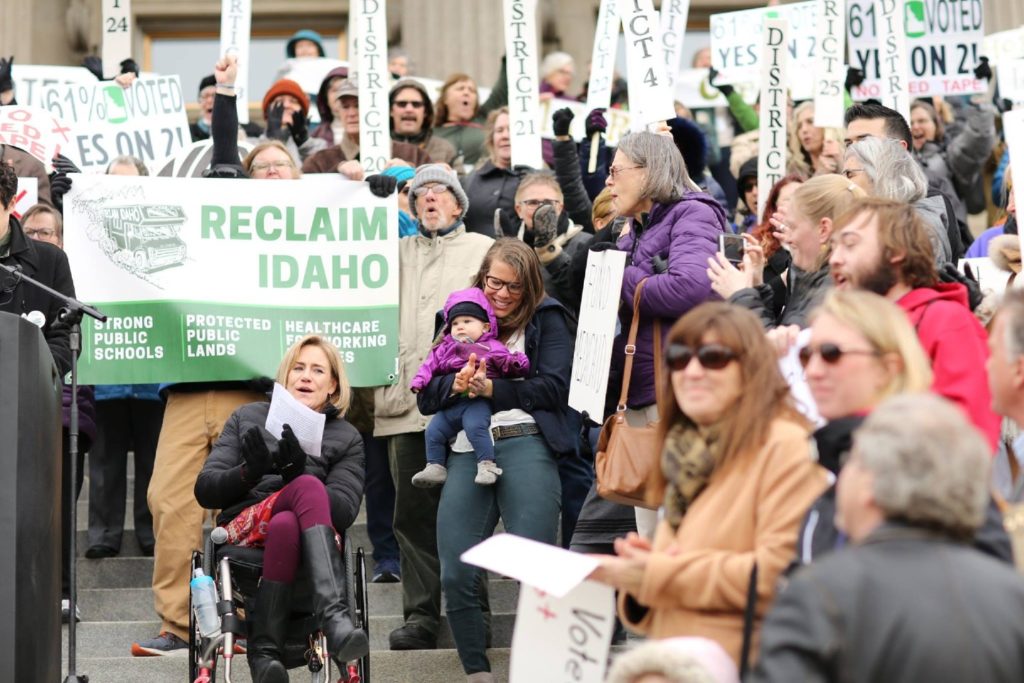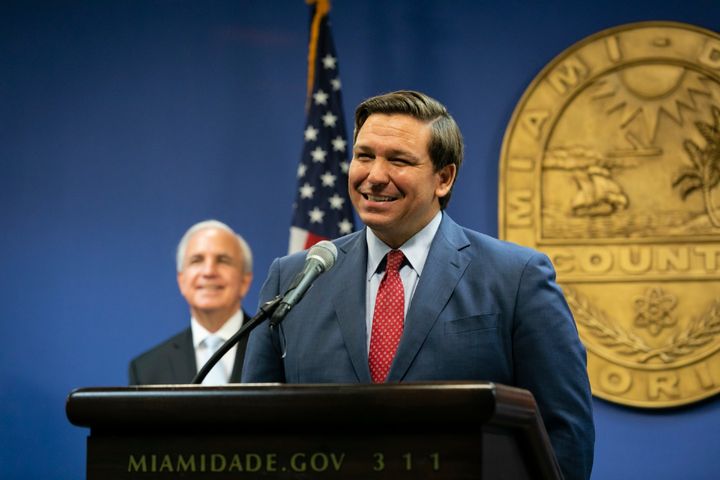This post was authored by journalist Lisa Newcomb.
In addition to an expansive push this year to restrict voting access, conservative lawmakers in at least 24 states want to make it more difficult for citizens to put initiatives on the ballot, according to a count from the Ballot Initiative Strategy Center (BISC), a progressive nonprofit organization that supports ballot measure campaigns.
Voters across the country approved 39 citizen-initiated measures in 2020. The Covid-19 pandemic posed unique challenges for initiative proponents, particularly regarding signature collection for measures to qualify for the ballot. In several states, lawmakers sought court opinions on electronic signature gathering, delaying or halting initiative efforts ahead of the general election.
The increased use of citizen initiatives to enact popular policies including codifying voting rights and ballot access, expanding Medicaid, decriminalizing or legalizing marijuana, and increasing the minimum wage has state lawmakers—primarily in Republican-controlled legislatures—working to prevent their constituents from voting on policies many elected officials oppose.
“Since 2016, we’ve seen a direct ramp-up of strategy, and a number of bills introduced to create barriers to accessing the ballot measure process or to increase restrictions,” Corrine Rivera Fowler, policy and legal advocacy director for BISC, told Sludge.
This year, lawmakers in Arkansas, Arizona, Florida, Idaho, Mississippi, and several other states have introduced or are considering proposals to tighten statewide ballot measure laws. Most of the states where these bills have been proposed have legislatures controlled by Republicans.
The citizen initiative is a direct democracy reform born out of the Progressive Era in the late 19th and early 20th centuries to counter government corruption, corporate monopolies, and concentrated power. Populist movements in the Midwestern and Western states that had coalesced around farmer and worker rights led the charge to give the people this check on their government in the early 1900s.
South Dakota was the first state to enact the process, followed by Utah, Oregon and Illinois. In recent years, lawmakers in some of these same Midwestern and Western states have worked to expand barriers to the citizen initiative process using a variety of tactics including increasing signature collection requirements, restricting time allotted to collect signatures, enacting single-subject rules that leave measures open to court interpretation, and increasing the voter approval threshold from a simple majority to a minimum of 60 percent.
Over the last decade, conservative politicians have escalated their efforts to limit citizen participation in the democratic process, largely in response to constituents approving policies that lawmakers refuse to consider.
This year, state representatives in Arkansas, Arizona, Missouri, North Dakota, and South Dakota introduced legislation that would raise the threshold for approval of ballot measures to three-fifths (60 percent), while Florida legislators hope to raise the bar to a 66 percent supermajority. Mississippi lawmakers have proposed a single-subject rule, and Republicans in Idaho, Utah and Virginia introduced other restrictive measures.
Idaho Lawmakers Respond with Restrictive Rules
Voters in Idaho approved a citizen-initiated ballot measure to expand Medicaid in 2018 with 62 percent of the vote. In every legislative session since, the Gem State’s most conservative lawmakers have proposed changes to the process, introducing more than a dozen legislative items since 2019.
Idaho already has one of the most restrictive ballot measure laws—in the more than 100 years since Idahoans gained the right to propose initiatives and referendums, only 37 measures made it to the ballot. Fewer have passed.
Following conservative education reform bills passed in 2011 by the Republican-controlled legislature, signed into law by Republican Gov. C.L. “Butch” Otter and supported by Republican state schools Superintendent Tom Luna, teachers unions organized a successful effort to reject those laws via three citizen initiatives in 2012.
In 2013, GOP lawmakers wasted little time enacting legislation governing signature collection. Idaho’s current law reflects those changes, mandating petitioners gather signatures from 6 percent of qualified voters in 18 of the state’s 35 legislative districts.
On the heels of voters approving the Medicaid expansion initiative in 2018, Republican representatives again responded by further regulating the process with restrictions including reducing time allotted for signature gathering, increasing the percentage of signatures needed in each district, and nearly doubling the total number of districts in which signatures would be required. That legislation, passed by the state GOP-led House and Senate, would have all but killed the citizen initiatives in the state were it not for Reclaim Idaho, a grassroots, volunteer-led organization behind the Medicaid expansion ballot measure. The group successfully launched a bipartisan campaign calling on Gov. Brad Little, a Republican, to veto the bill.
Professing his support for the restrictive reforms, Little “reluctantly vetoed” the legislation, citing potential legal action were he to approve it while issuing a transphobic statement warning of “the liberal Ninth Circuit Court of Appeals.”
This year, Idaho Senator Steve Vick, a Republican who has tweeted or retweeted election conspiracy theories, Covid-19 disinformation, and an invitation to supporters to “join me and 1,000,000 others” on the social media app Parler, a favorite of the GOP’s far-right, proposed new regulations for the state’s citizen initiative process. The State Affairs committee last week recommended passage, despite an outpouring of public testimony mostly against the restrictions.

“Let’s be clear: This bill is an attempt to make future grassroots initiatives virtually impossible,” Luke Mayville, co-founder of Reclaim Idaho, wrote in an op-ed published in newspapers around the state. Anticipating legislative approval of the measure despite public opposition, as was the case with the 2019 bill, Reclaim Idaho has once again launched a public awareness campaign urging Gov. Little to veto the bill.
Senator Vick’s proposal would amend the signature requirement from 6 percent of the qualified electors in 18 of the state’s 35 districts to 6 percent of electors in all 35 districts without increasing the timeframe for signature gathering. Additionally, SB 1110 has an emergency clause that would make the changes effective immediately, meaning it would directly impact initiative efforts for any upcoming elections.
“The bill is an unconstitutional restriction on the right of the people to control their government,” former Idaho attorney general and former state Supreme Court Justice Jim Jones, a Republican, wrote, following the committee’s approval of the bill. “After all, Article One of the Idaho Constitution solemnly proclaims that, ‘all political power is inherent in the people.’ It states that the people, ‘have the right to alter, reform or abolish’ the State government ‘whenever they may deem it necessary.’ How can the people possibly exercise that awesome power if they have to go through a power-hungry Legislature in every instance?”
Proponents of the measure—including the Idaho Farm Bureau, which advocated for the restrictive 2019 bill and against Medicaid expansion in 2018—argue rural voters are disenfranchised by the current process. But as Mayville pointed out, “Idaho’s Medicaid expansion initiative received signatures from all 44 counties. In fact, the entire campaign began in rural Bonner County and was bolstered by passionate teams of volunteers in rural communities across the state. The initiative received a majority of the vote in 35 of Idaho’s 44 counties, including dozens of rural counties.”
Mayville calls the current movement to restrict the initiative process a “red state assault” on direct democracy. Noting that conservative groups like the American Legislative Exchange Council (ALEC)—to which Senator Vick and at least 14 other acting Idaho state lawmakers have ties—have long pushed for more restrictive initiative laws, Mayville said what unites lawmakers against direct democracy is a variety of issues, not necessarily a party ideology.
“When you look at it nationally… there are all kinds of motives,” Mayville told Sludge. Whether it be citizens organizing initiatives and voting to expand Medicaid, legalize cannabis, or enact a $15 minimum wage, “there is something of a unifying trend. When you look at ALEC and you look at all these organizations, the ballot initiative is scary for them because it threatens to undermine their legitimacy.”
Editorial boards from at least two of the state’s major news outlets have come out in opposition of Senator Vick’s bill, acknowledging the anticipatory nature of the proposed restrictions.
“At least part of the motivation behind this bill is the fear that Idahoans might vote to legalize medical or recreational marijuana by ballot initiative,” the Post Register’s editorial board wrote.
Idaho Senator C. Scott Grow, a Republican, introduced a resolution in January that would effectively preempt both the state legislature and citizens from legalizing via ballot measure adult-use recreational cannabis or any other drug not already legal in the state and approved by the Federal Drug Administration (FDA). Not surprisingly, Senator Grow introduced the 2019 bill that would have drastically increased barriers to the initiative process in the Gem State. Senator Grow’s anti-drug measure passed the Republican-controlled Senate this month. Pending House approval, the resolution will appear before voters in 2022 per Idaho law.
“It is understandable that lawmakers don’t want the legalization of marijuana,” the Post Register’s editorial board wrote. “But it is intolerable for them to declare that the people should have no choice in the matter.
“And thinking these restrictions would prevent legalization from landing on the ballot someday is foolish. Marijuana is now a large, profitable national industry,” the board continued. “The marijuana industry can afford to pay an army of signature gatherers to spread out over Clark County and gather the required 6 percent. These restrictions will primarily target grassroots, poorly funded campaigns—the exact sort of campaigns which the ballot initiative is meant to support.”
Citizens, Advocates Fight to Protect Direct Democracy
“This really comes from a place where the ballot measure is a tool for our liberation,” Rivera Fowler said. “Initiatives are the people’s tool to create immediate and impactful change in their own lives, especially when their own leaders are refusing to act on these policies.”
In recent history, ballot measures were used to counter civil rights laws, Rivera Fowler said.
“If you look back at the history of ballot measures, before 2012, there was about a 20-year period of conservative ballot measures and attacks to the progressive community, attacks to labor unions and worker rights, attacks to civil rights, LGBTQ rights, marriage equality, gender equality, racial equality, and taxes were all under attack,” she said.
But around 2010, progressive advocates began using the citizen initiative process to enact popular legislation lawmakers resisted.
“What we really like is that we’re seeing voters across all party lines and demographics voting for good policy at the ballot,” Rivera Fowler continued. “It’s not a partisan issue. It’s about making their lives better.”
Voters in Missouri approved Medicaid expansion in 2020, making the state the sixth to greenlight closing the “Medicaid gap” via citizen initiative. Between 1996 and 2020, state voters approved 25 of 27 ballot measures to increase minimum wage. As of 2020, 19 of the 35 states and Washington, D.C. that have legalized medical marijuana did so via ballot initiative.
“It’s clear to us that voters support good policy,” Rivera Fowler said. “We need to continue to protect ballot integrity, protect the ballot measure process by blocking bad legislation, and work to continue to run strong, bold progressive policy through ballot measures.”
Toward that end, Reclaim Idaho intends to pursue an education funding initiative similar to the one halted by the United States Supreme Court at the request of Gov. Little in 2020. Representatives in some states without initiative laws are looking to enact them as well. State legislatures in Hawaii, Kansas, New Jersey, South Carolina, Rhode Island and New York are considering granting their citizens the right to place measures before voters.
“It goes directly against democracy to diminish our power,” Rivera Fowler said. “And lawmakers are only showing their own colors by attempting to make the process harder to access. They’re really doing themselves a disservice because voters will respond.”
Idaho Senator Steve Vick did not respond to a request for comment regarding his proposed legislation.



